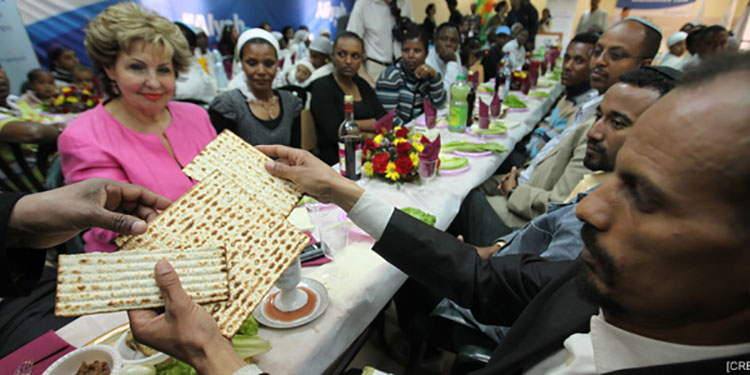Hope in Something Higher
Rabbi Yechiel Eckstein | April 2, 2015

In the past few months, our attention has been focused on several shocking and deeply disturbing events in the world around us – the depravity and cruelty of the ISIS terrorist group as it continues its murderous march across the Middle East, the precipitous rise of anti-Semitism in Europe, and Iran’s continued pursuit of nuclear weapons and the seeming failure of the international community to stop it. But we have hope in something higher.
Now, however, it is the time of year to focus on spiritual matters – and to again be reminded that, ultimately, it is our relationship with God that must inform our view of the world and our actions in it. It seems appropriate that this is happening in spring, a time of new beginnings and one of the holiest times of the year for both Jews and Christians. While Christians are preparing for the solemnity of Good Friday and the joy of Easter, we Jews are preparing for the observance of one of the most important holidays of the Jewish year – Passover.
Passover recalls the biblical Exodus, when Moses led the Jewish people from slavery in Egypt to freedom in the Promised Land, Israel. It was a sign of God’s favor toward His chosen people, and marked the birth of the Jewish people as a nation.
The primary observance for Jews on Passover is the seder meal, a ritual reenactment of the Exodus. The Bible says that on Passover we are to tell the story of God’s redemption of our ancestors from Egyptian bondage. The seder is the way in which we fulfill this obligation. In fact, more than simply retelling the story, we are to feel as if we ourselves experienced the pain of slavery and joy of liberation.
During Passover, Jews observe a number of dietary restrictions. Matzah, unleavened, cracker-like bread, is the only form of bread we may eat throughout the week-long holiday. Jews are told in the Bible, “For seven days no yeast is to be found in your houses” (Exodus 12:19). Thus, the days just prior to Passover are a flurry of activity as we clean the house and search for leavened products in every nook and cranny.
Though it may seem that these restrictions detract from the holiday, the laws and customs of Passover actually enhance it. This is a time for Jewish families and friends to come together, bound by fellowship and devotion to God. In particular, on the first two evenings of Passover when the seder is conducted, the atmosphere is one of feasting, prayer, joy, and hospitality.
My friends, as we approach this holy time, with hope in something higher, and as I thank God for the incredible success He has bestowed upon our ministry, I also thank Him for you. The Jewish people have enemies today, just as they did in the days of the Exodus. But the Passover story reminds us that God is still with us in all our trials and challenges. How comforting it is to know that today the Jewish people also have friends like you who will stand with us through thick and thin.
It is easy to despair as we look at the world and all its problems, especially when it seems that we often cannot find political solutions to those problems. But if this holy season reminds us anything, it should remind us that, as people of faith, Christians and Jews alike, we ultimately hope in something higher. I remember the words of the great Christian theologian Reinhold Niebuhr: “There is, in fact, no perfectly just solution of any political problem.” Perfection belongs to God alone. Let us never forget Who is the ultimate authority: the God to Whom the Israelites “groaned in their slavery and cried out” (Exodus 2:23) for help prior to that first Passover, the same God of Whom it is said, “Blessed are those whose help is the God of Jacob, whose hope is in the Lord their God” (Psalm 146:5).
Today, I want to wish a happy Passover to my Jewish friends; to my Christian friends, a happy Easter; and to all, God’s blessings of shalom, peace.
